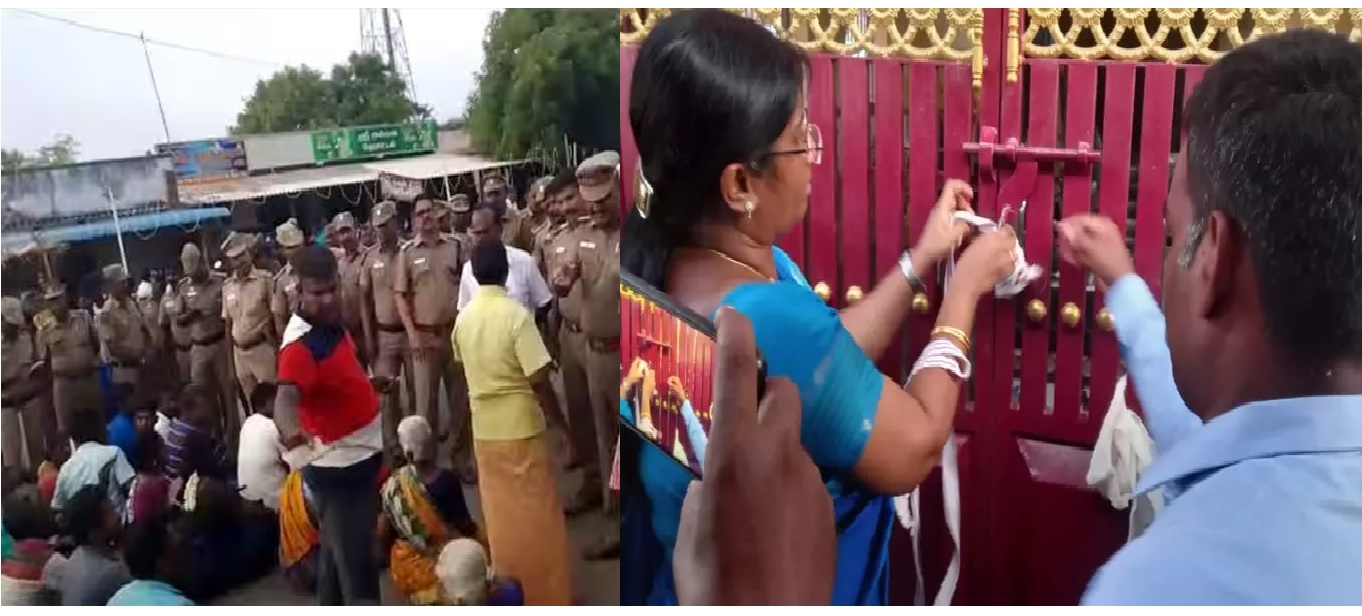The upper-caste Hindus of Veeranampatti held up traffic on the Tiruchy-Palayam National Highway, insisting the officials remove the seal.

After sealing the temple, the RDO called representatives of both communities to the district headquarters for peace talks on 10 June. (Supplied)
Days after a temple in Viluppuram in Tamil Nadu was sealed for denying entry to Dalits, another temple in Karur in the western region of the state was locked and sealed by government officials for the same reason.
According to Revenue Department officials, the Veeranampatti village near Kulithalai in the Karur district is dominated by Urali Gounders, a part of the larger Gounder community.
Nearly 200 families of Urali Gounders and 80 families of Dalits reside in the village.
The Kaliamman temple, which is built on the government’s poramboke land (these are unassessed lands that are the property of the state government), is administrated by upper-caste Hindus.
Dalits have not been allowed inside the temple for years.
On Wednesday, 7 June, a Dalit youth named P Sakthivel entered the temple to worship the goddess on the occasion of the Visakam festival, which was being celebrated there for a week.
However, the temple priest and the temple administrators allegedly manhandled Sakthivel and threw him out of the temple.
Following this, there was an altercation between the people of the two communities.
On Thursday, Sakthivel petitioned the district authorities regarding the discrimination and sought action against the people who forbade the Dalits’ entry into the temple.
Upon receiving information, the Revenue Department and police officials went to Veeranampatti to hold talks with the upper-caste Hindus.
Sensing the arrival of the officials, the Hindus locked the temple and sat in front of it, not allowing any of the officials to enter it.
S Kalliannan, a resident of Veeranampatti who belongs to the Gounder community, told South First that agriculture was the primary occupation of the villagers, and that the Kaliamman temple belonged to their forefathers.
He added that they treat the deity of the temple as their “kula daivam” (goddess of the clan).
“The belief is that Goddess Amman gives rain for agriculture after every Visakam festival. Since it is a kula daivam temple, only the people belonging to the clan are allowed to enter the temple, which is a custom that has been followed for years,” said Kalliannan.
He added, “We are not discriminating against the other community. We are protecting the custom that has been followed for years.”
The officials held peace talks with the representatives of both communities. Citing their age-old custom, the Urali Gounders remained steadfast in their stand to not allow the Dalits inside the temple.
A Revenue Department official told South First: “District Collector Prabhushankar was keen on taking the Dalits inside the temple without any caste conflict, and instructed Kadavur tahsildar Muniraj, Karur district ADSP Mohan, and Kulithalai DSP Sridhar to conduct peace talks with the villagers.”
The officer added: “The officials also held talks with the upper-caste Hindus and told them that preventing the Dalits from entering the temple would attract sections of the Prevention of Atrocities of SC/ST Act, and it was against the Constitution. But they were very stubborn. At some point, the message was passed on to the Revenue Divisional Officer (RDO).”
RDO Pushpa Devi rushed to the village and, on her part, explained the consequences of preventing Dalits from entering the temple and the right to worship.
Since no amicable and consensual decision was arrived at, the RDO decided to seal the temple.
Soon after the RDO locked and sealed the temple, around 300 upper-caste Hindus surrounded the officials. They blocked the road and did not let the officials’ vehicles move on.
Additional police personnel had to be called on to extricate the officers from the location.
The RDO also called the representatives of both communities to the district headquarters for peace talks on Saturday.
E Suresh, a Dalit youth from the village, said, “It is true that the upper-caste Hindus are maintaining the temple, but the temple is on government land and no one has the right to stop us from entering the temple just because we are Dalits.”

The caste Hindus of Veeranampatti Village holding a road roko. (Supplied)
He also insisted that the government not allow the discrimination that was being practised in the name of customs.
He noted that the temple came under the control of the Hindu Religious & Charitable Endowments Department.
Meanwhile, on Friday, the upper-caste Hindus of Veeranampatti stopped traffic on the Tiruchy-Palayam National Highway, insisting that the officials remove the seal of the temple.
Police officials were said to be holding talks with the protestors. District Collector Prabhushankar was not available for comment.

Jul 26, 2024

Jul 25, 2024

Jul 21, 2024

Jul 21, 2024

Jul 21, 2024

Jul 21, 2024